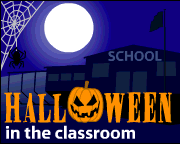October 30th, 2020.
Culture and Education
HALLOWEEN: A CONTEMPORARY CROSS-CUTTING THEME IN SCHOOLS

by Prof. Dr. Raquel Silvano Almeida
October is the month when the globally known festivity from the North-American folklore - Halloween - takes place (October 31st). Private language schools across Brazil are decorated with witches, pumpkins and bats for the celebration of Halloween. It is evident the presence of such a cultural phenomenon in Brazil at this time of the year, whether in schools, commerce and the media.
Halloween is a fundamentally mystical celebration, referring to a pagan Celtic tradition of almost 2,000 years ago. This tradition was based on the belief that in the passage from the night of October to the first of November, which marked the New Year, the spirits of the dead came to join those of the living. Later, the Catholic Church traditionally adopted this day as ‘All Saints' Day’.
Food for thought: How can we educate our students about this foreign culture? How can we teach them this cross-cultural issue?
School is a social place where urgent issues that question human life, the reality that is being built, and that require macro-social transformations, and also, personal attitudes need to be introduced to students. Therefore, the theme of Halloween can be studied through school contents that lead the pupils to debate, to a cultural relativism and to critical thinking, in curriculum disciplines, such as languages, geography, history, philosophy, and art.
The National Curriculum Guidelines (DCNs) (CNE / CEB No. 7/2010 and No. 12/2012) and BNCC (2018) establish the contemporary cross-cutting themes as essential contents for Primary and Secondary Schools, due to their contribution to the development of skills related to curriculum disciplines and as guides for systematized pedagogical practices in Brazilian schools.
Based on these educational documents, which have established a curriculum for the so-called ‘contemporary cross-cutting themes, wouldn’t Halloween be an emerging content in the English language classes, since language and culture are intrinsically related for language expresses, incorporates and symbolizes a culture? The transversal nature of this theme at school seems inevitable for it is a cultural event that has been incorporated in our social spaces, without sound knowledge of its historical, cultural, political and religious grounds.
All in all, it is necessary to understand that unless the school plays its role well in teaching students contemporary cross-cutting issues, such as the Halloween festival, in different areas of the school curriculum, other social spheres will continue to do so, so that students will remain unaware of the historical, political, cultural and religious conditions underlying the true meanings of those 'foreign' cultural events that are incorporated into our everyday lives.